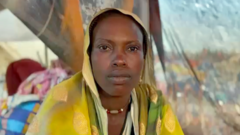The Israeli defense minister, Israel Katz, has announced that troops will remain in designated “security zones” within Gaza after the current conflict, in a bid to create a buffer for Israeli communities. This comes as the Israeli military has expanded its control over a significant portion of Palestinian territory during an offensive that has entered its fourth week. Despite international pressure and dire humanitarian conditions in Gaza, Israel is continuing its blockade of humanitarian aid as leverage against Hamas to secure the release of hostages.
Israeli Defense Minister Confirms Troop Presence in Gaza After Conflict

Israeli Defense Minister Confirms Troop Presence in Gaza After Conflict
Israeli authorities plan to maintain military presence in newly established security zones of Gaza, aiming to ensure protection for communities amid ongoing hostilities.
Katz emphasized the need for a sustained military presence, stating that the Israel Defense Forces (IDF) would retain control over territories critical for security against potential threats. With ongoing airstrikes across Gaza, the humanitarian situation has become increasingly grim, with organizations alerting the world to the rising death toll and urgent needs for basic supplies.
Victims of the conflict are mounting, with local health officials reporting over 1,650 fatalities in Gaza since hostilities resumed on March 18. Hospitals are struggling to cope with the surge in casualties, and claims of severe shortages in medical supplies are rising, further complicating relief efforts. The United Nations has issued warnings of a deteriorating humanitarian crisis, indicating that a large percentage of Gaza is now under military evacuation orders.
As international bodies raise alarms about the humanitarian toll, Israeli officials maintain their strategy of using the blockade to pressure Hamas. The military operation is, according to Israeli commentary, aimed primarily at ensuring the safety and security of its citizens, yet critics argue it has led to significant civilian suffering in Gaza.
Calls for a ceasefire and negotiations over the release of captives remain central to the discourse, with Hamas insisting on Israeli troop withdrawals as a condition for peace, while also explicitly rejecting disarmament proposals. The complexity and urgency of the situation continue to unfold, with implications for both Israeli and Palestinian societies.
Victims of the conflict are mounting, with local health officials reporting over 1,650 fatalities in Gaza since hostilities resumed on March 18. Hospitals are struggling to cope with the surge in casualties, and claims of severe shortages in medical supplies are rising, further complicating relief efforts. The United Nations has issued warnings of a deteriorating humanitarian crisis, indicating that a large percentage of Gaza is now under military evacuation orders.
As international bodies raise alarms about the humanitarian toll, Israeli officials maintain their strategy of using the blockade to pressure Hamas. The military operation is, according to Israeli commentary, aimed primarily at ensuring the safety and security of its citizens, yet critics argue it has led to significant civilian suffering in Gaza.
Calls for a ceasefire and negotiations over the release of captives remain central to the discourse, with Hamas insisting on Israeli troop withdrawals as a condition for peace, while also explicitly rejecting disarmament proposals. The complexity and urgency of the situation continue to unfold, with implications for both Israeli and Palestinian societies.



















